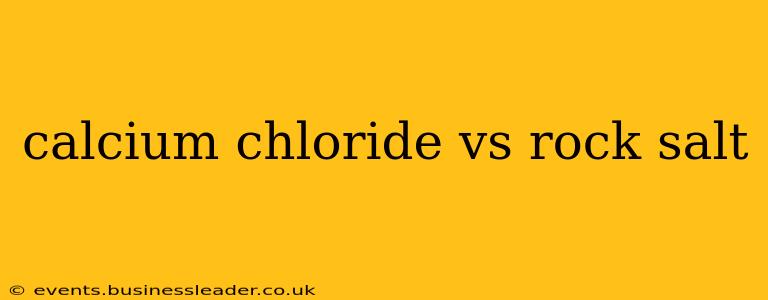Winter's icy grip can make roads and sidewalks treacherous. To combat this, many rely on de-icing agents like calcium chloride and rock salt (sodium chloride). But which is the better choice? The answer depends on several factors, and this guide will explore the key differences to help you make an informed decision.
What is Calcium Chloride?
Calcium chloride (CaCl₂) is a chemical compound that, when dissolved in water, lowers its freezing point significantly. This makes it an effective de-icer, even at lower temperatures than rock salt. It's known for its rapid melting action and its ability to work in colder conditions.
What is Rock Salt (Sodium Chloride)?
Rock salt, or sodium chloride (NaCl), is a common and inexpensive de-icer. It's readily available and relatively easy to use. However, it's less effective at lower temperatures and can be more damaging to the environment than calcium chloride.
Calcium Chloride vs. Rock Salt: Key Differences
Here's a breakdown of the key differences between calcium chloride and rock salt:
Melting Temperature:
- Calcium Chloride: Effective down to -25°F (-32°C) or even lower, depending on concentration.
- Rock Salt: Effective down to around 20°F (-7°C). Below this temperature, its effectiveness drops significantly.
Melting Speed:
- Calcium Chloride: Melts ice faster than rock salt due to its greater ability to absorb moisture from the air.
- Rock Salt: Melts ice more slowly and requires higher application rates to achieve the same effect as calcium chloride.
Environmental Impact:
- Calcium Chloride: Generally considered less damaging to the environment than rock salt, though both can affect plant life and waterways if overused. It has a lower sodium content and is less likely to cause soil salinization.
- Rock Salt: Can contribute to soil salinization, harming plant life and potentially contaminating water sources. Its high sodium content is a primary concern.
Cost:
- Calcium Chloride: Typically more expensive than rock salt.
- Rock Salt: Significantly cheaper than calcium chloride, making it a budget-friendly option.
Corrosion:
- Calcium Chloride: Less corrosive to concrete and metals than rock salt, though still has some corrosive properties.
- Rock Salt: More corrosive to concrete, metals, and vehicles than calcium chloride.
Pet and Plant Safety:
- Calcium Chloride: Less toxic to pets and plants than rock salt, but contact should still be minimized.
- Rock Salt: Can be harmful to pets if ingested, and it can damage vegetation.
Which De-Icer Should I Choose?
The best choice depends on your specific needs and priorities:
-
Choose Calcium Chloride if: You need a de-icer that works quickly and effectively in very cold temperatures, and you prioritize minimizing environmental impact and corrosion. Cost is a secondary concern.
-
Choose Rock Salt if: You need a budget-friendly option and the temperatures are relatively mild. You understand the potential drawbacks regarding environmental impact and corrosion.
What are the disadvantages of using calcium chloride?
Calcium chloride, while effective, does have some drawbacks. While less corrosive than rock salt, it can still contribute to corrosion over time. It can also be irritating to skin and eyes, so protective gear should be worn during application.
What are the disadvantages of using rock salt?
The primary disadvantages of rock salt include its lower effectiveness at cold temperatures, its higher corrosiveness, and its significant environmental impact. Overuse can lead to soil salinization and water contamination.
Is calcium chloride better for the environment than rock salt?
Generally, yes. Calcium chloride has a lower sodium content than rock salt, reducing the risk of soil salinization and water contamination. However, neither de-icer is completely environmentally benign, and overuse should be avoided.
Is calcium chloride safe for pets?
Calcium chloride is less toxic to pets than rock salt, but ingestion should still be avoided. Keep pets away from treated areas until the de-icer has melted and been washed away.
Is rock salt safe for plants?
Rock salt can damage plants due to its high salinity. Avoid applying it directly to plant beds or lawns.
By carefully considering these factors, you can select the de-icing agent that best meets your needs while minimizing potential negative consequences. Remember that responsible application and minimizing overuse are crucial regardless of your choice of de-icer.
